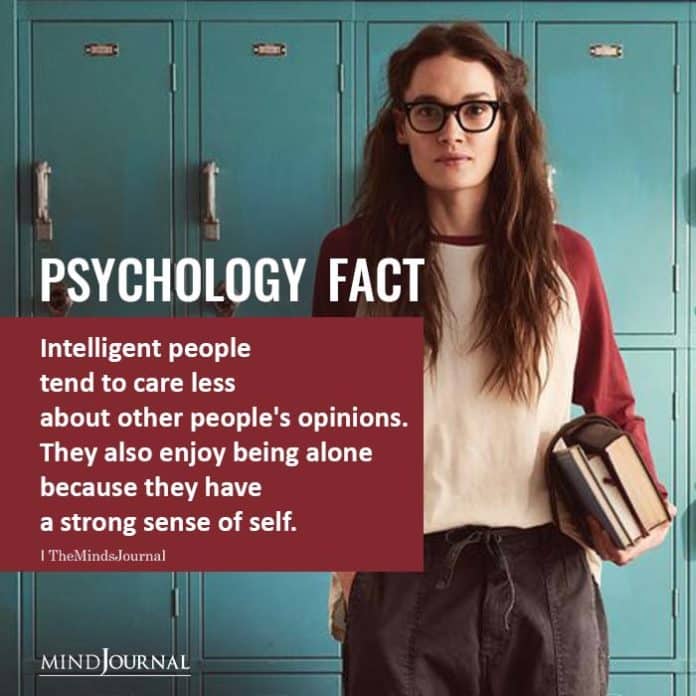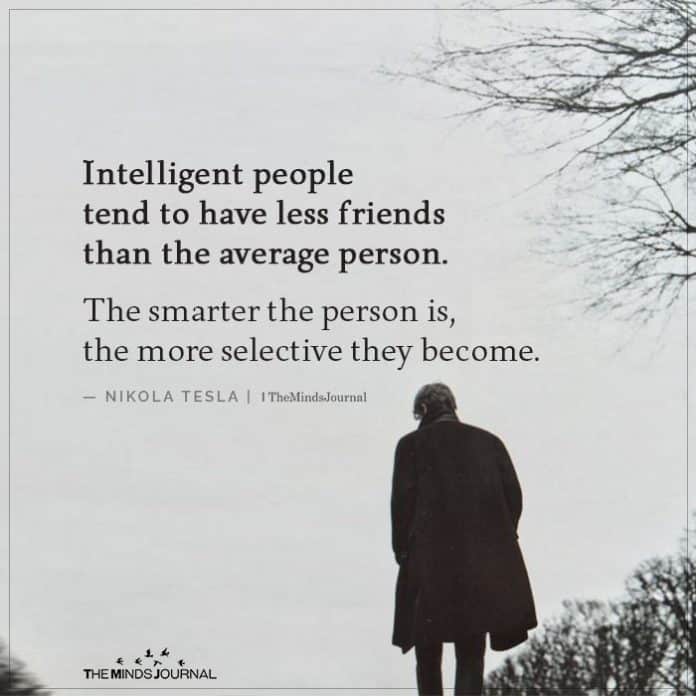A study revealed that intelligent people prefer to be alone, tend to have fewer friends and they choose to be less social than those who scored less on the intelligence scale. Interestingly, their life satisfaction appears to be unaffected by their more secluded lifestyle.
Do you imagine yourself living alone? In that imagination, are you happy and complete in yourself?
Do you feel that the rhetoric of society that makes us feel that we need other people is useless?
Do you ever want to live like a hermit?
Would you prefer the silence of the countryside to the noisy hustle and bustle of the city?
Would you prefer spending your time reading a book rather than going to a crazy noisy party?
Do your parents worry about you not making enough friends?
If this sounds anything like you, I think you have less reason to worry now. For a very long time now, you have worried about not having a social life. You really stress yourself out every Friday about your weekend plans and you are worried that the pace at which the world is functioning is not your speed at all.
But, I guess all of this is just fine. Society may easily deem you as anti-social but society doesn’t know that it is proven that you are an intelligent person.
Shocked? Yes, throw this into everyone’s face now.
Let’s find out why intelligent people prefer to be alone.
Related: Intelligent People Have Fewer Friends: 8 Reasons Why Intelligent People Lack Social Skills
Research On Intelligent People
1. Quality of socialization matters
The study works on the premise that people are happier when they live in less densely populated areas. Thus, the happiness quotient increases as soon as the population of people around you decreases. Also, happiness increases when interaction decreases.
According to a recent study, the genius category amongst us finds it extremely hard to associate and socialize with other people.
It is not because of the idea that they are anti-social but it is actually because this category does not get any satisfaction out of social engagements as they deem these engagements to be petty and puerile. They are unable to adjust to the pressure of such social interactions and hence dismiss them.
According to evolutionary psychologists, intelligent people prefer quality over quantity when it comes to socializing. So, they are happier when they communicate with their close friends and family, rather than with strangers, co-workers, distant relatives, or colleagues.
The majority of the participants in the study, become happier with an increase in social interactions, with the exception of those scoring high on the intelligence scale. This effect was reversed in the case of highly intelligent people.

2. Life satisfaction
As the researchers explained, “More intelligent individuals experience lower life satisfaction with more frequent socialization with friends.”
This means that people who interact less are far happier than people who spend most of their time socializing. This is because the people who socialize less live a far simpler life with less stress and confusion but this is not true for people who socialize more.
The basic thing that the study proves is the fact that some people do not always want to spend their time placating and adulating other people. They really have better things to do.
It is psychologically proven that in order to be able to interact with other people in a better way, you need to carry a pretense; an “image” of yourself that other people will like.
This means that most of our social relations are based on approval. So all we seek from the people around us is approval and we spend most of our time and energy in order to get this approval from other people. In the process of seeking this approval, we totally forget to be ourselves and thus our identity gets distorted.
Related: Reasons Why Intelligent People Face Difficulties In Having A Relationship
We become less of the person that we actually are and more of the person that other people want us to be and this is not necessarily good because such kind of habit will make us less unique.
All the unique, quintessential gifts that we have will be lost to homogeneity. We will be more alike and lose ourselves forever. But the genius knows this problem so very well.
By limiting human interaction, the genius and the highly intelligent people choose to be in their own caves. They do not go through the turmoil of pleasing other people and are thus happier living their own life.
This gives them more time to spend and to work on themselves. The time that they get works as a blessing for them as it makes them even better than before.
According to Carol Graham, who studies the economics of happiness, people with more intelligence and the capacity to use it spend less time socializing because they are focused on some other longer-term objective.
Intelligent people are less social because they are more focused on their life goals. They also remain happier because of the fact that they are unaffected by other people’s judgment of them.

Of course, when you are around other people, and when you socialize, you are bound to get affected by what other people think and assume about you; but not the highly intelligent ones. This happens because they maintain the ideal distance from other people which helps them to be unaffected by what other people think.
Related: Intelligence And Loneliness: Why Highly Intelligent People Struggle to Find Love
3. Solitude
Moreover, highly intelligent people have mastered the art of solitude.
While most of us find it extremely hard to live alone and our lives go haywire as soon as we lose the precious internet connection, intelligent people, on the other hand, can manage on their own.
They actually prefer life without all the things that they consider unnecessary distractions.
What made our ancestors happy?
According to Savannah’s Theory of Happiness, people find happiness in the same things that used to make our ancestors happy. The population density in the savannah was low, and interpersonal interaction was important for survival.
It can be interpreted based on the latest study results that most highly intelligent people may have evolved past the need for frequent social interaction.
So, they only love to prefer activities that are intellectually and economically oriented, because these activities are ultimately important for surviving in the modern world. The world of ancestors was different from this current digital world.
So, the next time someone asks you why you deny social engagement and people tell you that you will die alone with your cats, don’t hesitate to tell them that your life is richer and fuller than the petty lives that they are leading. Don’t you ever be shy of choosing your happiness over social engagements! EVER!
Related: Why Intelligent People Can’t find Happiness
That said, not all the people who choose to be alone and act weird are intelligent! Although some of them could be.
Want to know why highly intelligent people like to be alone? Check this video out below!
The Minds Journal Articles Volume -1 is Copyright Protected vide Regd.# L-103222/2021














Leave a Reply